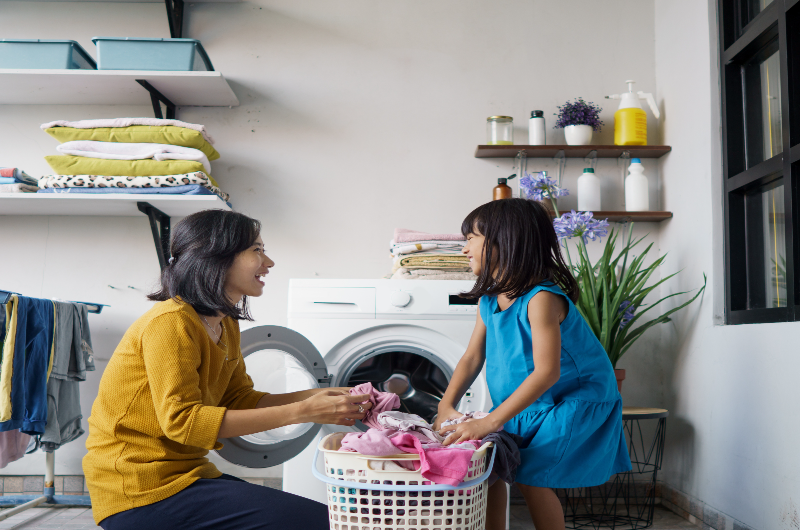
The Importance of Quality Time in Parenting and How to Create it
Creating a healthy and balanced emotional attachment with your child is important.
A common denominator between working and stay-at-home mums is having too many tasks to attend to and not enough time to do them all. You are on a mission to ensure you’re giving your best as you raise the exceptional child yet finding balance along the way can be challenging. And when bedtime finally arrives, you look at your sweetly sleeping little angel and feel consumed by the guilt of not spending enough time with your child. But what if we told you that it is not really about the duration of time you spend with your little ones and what is more important is the quality of the time you spend with them?
Quantity Vs. Quality in Parenting: What Does Science Say?
Ground-breaking research from the Journal of Marriage and Family1 suggests that quality of time spent with children trumps quantity. In this large-scale longitudinal study about how parents spent time with their kids, researchers found that the amount of time parents spent with children between three to 11 years old had almost no connection to how they turned out as young adults. However, the quality of the time parents spent with their little ones had a positive impact on children’s academic achievement, behaviour, and emotional well-being.
That’s not to say that parent-child time is not important. It’s about ensuring that whatever time is spent with your little ones, is well spent.
What is Quality Time and What are Its Benefits for Children and Parents?
Spending quality time is one of “love languages” described by award-winning author Gary Chapman in his book, The Five Love Languages3. When it comes to your child, spending quality time really just means being fully present and focused on your little one when spending time together.
It means that when you are with your little ones, you should tune in and be in the moment with them. In other words, just 30 minutes of your undivided attention on your child will go much further in helping you to raise an exceptional child, than spending many hours of phone-distracted time with him/her.
When you spend fully focused quality time with your children:
- You can instil everlasting good values in them, as children observe, process, and assimilate these habits from their parents.
- You can better understand their strengths and weaknesses, which enables you to hone leadership qualities like confidence and strength in them.
- You can better observe, understand, and effectively address stumbling blocks in their learning.
- You can make your child feel loved, validated, secure and trusted, knowing your full attention is on him/her.
All these factors together help you nurture the exceptional that is already in your child, forging an unbreakable bond with your little one and encouraging lifelong learning for his/her holistic development. So how do you spend good quality time with your little one? Try these practical ideas and tips that you can incorporate in your daily routine with your child.
How to Spend Quality Time with your Child
1. Do Chores Together

The many household chores parents have to handle every day often get in the way of spending quality time with their kids. But it doesn’t have to be like this. Involve your little ones in household chores, too! You can start when your kids are even as young as two years old.
When you do this, obviously you get the chores done faster, and that frees up more time to spend with your children. But more than that, your little ones learn new life skills like teamwork, responsibility, cooperation, and self-control, that are sure to benefit them through life. Added bonus? You both get better at understanding each other and working together. You could even throw in some on-the-spot learning moments for your children: “Let’s sort these clothes by colour. Can you put all the blue clothes in one pile?”, “How many books can you count on this rack when you put them all back?” and, “The recipe calls for 3⁄4 cups of sugar. How many of these cups is that?”
2. Take up a Class Together
We focus so much on sending our children for classes. But you have ever thought of the remarkable bonding and learning opportunities that are present for you and your kids when you take a class together?
When you do so, you spark your children’s curiosity to learn new things and you learn alongside each other. This is so important because your children see you as infallible and all-knowing. But by showing them that learning still hasn’t stopped for you, you teach them the value of lifelong learning. Together with you, they manage the challenges of learning a new skill. Through this, your child’s executive function skills like working memory and cognitive flexibility are honed. They also gain skills such as self-confidence and critical thinking that will prepare them for the challenges that lie ahead in both their educational and personal journeys. Furthermore, learning something new together also helps you to recognise your child’s abilities, which reminds you that every child is good at something.
3. Go on a Mummy-Child Date!

This idea is especially useful for parents of multiple children (even though it also works for parents of one child). When you’re pulled in many directions by two or more kids, you may end up not spending quality time with any of them. However, when you dedicate focussed, one-on-one time with each of your children (or your only child), the benefits are remarkable.
Just like how you plan date nights with your partner put time and effort into planning and scheduling regular quality time with your children. This time should be “sacred” and devoid of distractions like phones or work. Make it educational by planning a trip to the museum or library with your primary schooler or going on a nature walk with your toddler. Ask plenty of open-ended questions to promote learning, and let your child ask you questions, too. Finish your day bonding over your child’s go-to snack or dinner at your child’s favourite restaurant, while you hone your little one’s working memory by asking him/her about what his/her favourite part of the day was. Even a simple trip to the playground or time spent reading a bedtime story present extraordinary bonding and learning opportunities. And each time, you’re bound to learn something exceptional about your little one that will make you glow with pride!
4. “Rose and Thorn”
Every day at dinnertime, get each family member to share their “rose and thorn”, or the best and worst thing that happened to them each day. It is a great way to connect and helps your child to verbalise his/her thoughts and get better at communication. It also helps you to identify teachable moments and emphasise to your child that life ebbs and flows and comes with challenges as much as it does with opportunities. Remember to create a non-judgmental space for your child to express his/her experiences comfortably. If your little one’s “thorn” is extra-sharp, engage in a problem-solving discussion with your child about the best way to tackle the issue.
5. Get silly, let loose

Too often in parenting, we get caught up with the serious stuff, the stress and the anxiety that raising little one's entail. We lose the little child who lives in all of us. Set that inner child free once more and let him/her laugh again, but this time with your own little one.
When you allow yourselves to get silly with each other, you break barriers and show children that it is fine to let your hair down and truly be yourselves around each other. You also send a message about the importance of relaxing and having moments of fun, joy, and love (and of course, learning), that life is not all serious.
When you tickle your toddler and kiss those adorable little feet and fingers while counting each one, you’re relaying this strong message: “Mummy loves you so much!” By counting those wee digits aloud as you kiss them, you are reinforcing your little one’s basic math skills at the same time. When you play silly dress-up games with your pre-schooler, you’re engaging in incredible bonding moments with him/her, while encouraging your child’s creativity and imagination. When you crack jokes with your primary schooler (“Who is your food’s best friend? Your taste buds!”), you’re connecting with your child in beautiful ways while teaching cognitive flexibility related to the nuances and many meanings contained in words and phrases.
Just don’t forget to have your camera ready so that you capture many precious moments with your children!
The possibilities of how you spend quality time with your child are endless. Now that you’re equipped with this new knowledge, the days of feeling guilty about not having enough time or feeling anxious if you’re doing enough for your child’s future should become history. Instead, plan a couple of activities, set aside time for it and start spending that much needed quality time with your child.
References:
- Journal of Marriage and Family – Families under the microscope: repeated sampling of perceptions, experiences, biology and behaviour.
- Ministry of Education, Guyana.
- Five love languages, revised edition by Gary Chapman.
- https://lemonlimeadventures.com/20-ways-to-spend-quality-time-with-kids/
Secondary references:

